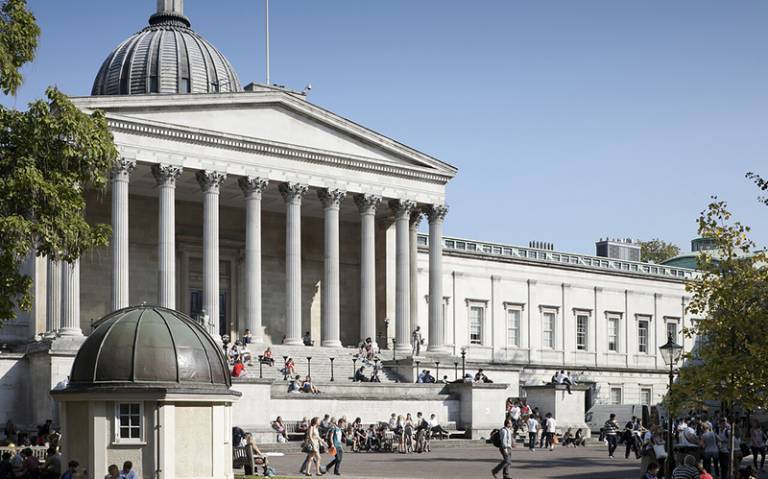UCL statement on Student Group Claim
21 February 2024
UCL and the lawyers acting on behalf of students seeking redress due to changes in teaching brought about by the pandemic and industrial action, have mutually agreed to lift the stay on High Court proceedings.

In July last year, Senior Master Fontaine paused High Court proceedings for eight months and asked UCL and the claimants’ lawyers to explore UCL’s proposed Alternative Dispute Resolution (ADR) process.
This ADR allows students to engage with our existing well-established complaints process, with the ability to complain to the Office of the Independent Adjudicator for Higher Education (OIA), should they be unsatisfied with UCL’s decision. Both services are free of charge for students.
In requesting the pause, the Court acknowledged the ‘ready-made’ ADR process had the potential to resolve all, or a large proportion, of the students’ claims provided they are resourced and managed in a timely fashion and would save substantial time and legal costs.
Unfortunately, despite this and attempts at further mediation, this ADR process has been rejected by Assersons and Harcus Parker, the lawyers representing the ‘Student Group Claim’.
An application to lift the stay of proceedings has now been submitted to the High Court. We now expect the High Court to list a Case Management Conference for further directions as to how the case should proceed.
Responding, Professor Kathy Armour, UCL’s Vice-Provost (Education & Student Experience) said: “We and the claimants’ lawyers have mutually agreed to lift the stay of the Court proceedings so that the litigation can proceed.
“Disappointingly, our ready-made Alternative Dispute Resolution proposal, where students could use our internal complaints procedure and, if not satisfied, refer UCL’s decision to the Office of the Independent Adjudicator, was flatly rejected by the claimants’ lawyers.
“This process was acknowledged by the High Court as a suitable form of resolution and we consider it to have been the most appropriate way for the Court proceedings to be resolved without further expense. We are disappointed that this is unable to proceed.
“As further mediation has also been attempted, in good faith, and this was unsuccessful, we now await the Court to list a Case Management Conference, for further directions as to how the case should proceed.
“Throughout these proceedings UCL has never sought to dispute the right of individuals to access the courts to bring claims as a matter of general principle."
At the previous hearing in May last year, the claimants’ lawyers applied for a Group Litigation Order (GLO) to manage the claim, that consisted of 924 named students, going forward. A GLO is a case management procedure where multiple claims sharing common issues can be dealt with as one single claim. This was refused by the Court at the time.
In the July ruling, Master Fontaine raised concerns about whether the GLO application could proceed without the claimants providing the Court with enough information to determine whether there are sufficiently related issues (as required for a GLO application) and what they are likely to be for the purposes of deciding whether to make a GLO.
Professor Armour added: “Unfortunately this will further delay any outcome for the students, something we have tried to, and were keen to, prevent. We know the last few years have been a very difficult time for many students. They have faced challenges and disruption from COVID and, in some cases, industrial action. Supporting our students, their wellbeing and their educational achievements is always UCL’s priority.
“Throughout the COVID-19 pandemic, we prioritised the health and safety of our whole community and followed UK Government guidance, working tirelessly to make our campus and all UCL premises as safe as possible so that a high-quality academic experience could continue to be provided.”
- What happens next?
A consent order to lift the stay of proceedings has now been filed with the High Court. We expect the next steps will be for the High Court to list a Case Management Conference, so that further directions as to how the case should proceed can be given.
- How many students does this case apply to?
The Claim Form issued at Court lists 924 individual students claimants. At this stage, no other students have been formally added to the claim.
- What happened to the Group Litigation Order?
At a hearing in May, the High Court was asked by lawyers on behalf of the claimants to decide whether a GLO should be granted to cover this claim. A GLO is a procedural mechanism that allows the court to manage numerous individual claims collectively, where they give rise to common or related issues of fact or law.
The Court was not being asked to determine the substantive claims; only whether it should exercise its discretion to make a GLO. UCL’s view was that the GLO application was and remains premature as there is an expectation under the Court rules that parties should first exhaust available alternative dispute resolution (“ADR”) procedures, before incurring the significant time and cost of bringing claims to court via GLO procedures.
Although, the application for a GLO was not dismissed, Senior Master Fontaine agreed with UCL’s submission that the GLO application was premature, and that ADR should be explored before the case could proceed any further. The Master ordered that the litigation should be stayed for a period of 8 months.
 Close
Close

